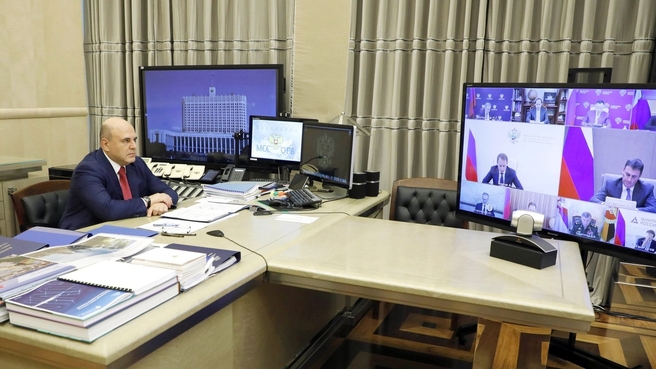The first item on the agenda: development of the Russian mineral resource base.
Mikhail Mishustin’s opening remarks:
Good afternoon, colleagues.
Today the Government meeting agenda includes a block of education-related issues. We must create conditions for children to study in up to date and comfortable buildings that have everything they need to learn, practice sports, grow and develop. It must be comfortable and interesting for them to study there.
Today we will allocate almost 43.5 billion roubles to build new schools in 28 Russian regions. The regions will receive 21 billion of this sum already this year. The rest will be transferred to them within the next two years.
It is also important for schoolchildren to have good access to educational institutions, above all in rural areas. In line with the President’s instructions, the Government will purchase at least 4,100 school buses for the regions by the end of this year. We will allocate almost 10 billion roubles for this.
Now to decisions regarding villages. We will support our farmers and cooperative farms. We will lift the ban on selling their products on their agricultural lands. In order to do this, we will make several amendments to the federal laws regulating this sphere. The President has issued instructions on this matter.
This will help to decrease costs. In addition to selling produce at markets and fairs, which are usually located far away, farmers will now be able to set up mobile stalls on their farms or designate an area in specially equipped premises that they already use. They will be able to attract customers who live nearby and who want to purchase fresh vegetables, dairy products and meat directly from the farms.
Today, we will set aside an additional six billion
roubles for developing rural territories. This decision was also made as per
the President’s instruction. Of this amount, two billion roubles will be spent
on rural mortgages. This will allow an additional 14,000 families to improve
their living conditions, and the number of such families is to reach 35,000
before the year is out.
We will spend about 2.8 billion roubles on expanding the social and utility infrastructure under a project dealing with the modern image of rural territories. This funding will make it possible to implement the relevant projects in 26 Russian regions.
Over one billion roubles will be spent on building and improving playgrounds and sports facilities, recreational areas, street lighting and the pedestrian infrastructure in 44 Russian regions. We will also allocate 68 million roubles for building a road to an orpgan centre in the Kostroma Region.
Here is another matter. Today, we will distribute almost 1.2 billion roubles for building motorways in nine regions. As per the President’s instruction, most of this sum, or over one billion roubles, will be spent on subsequent clean-up operations following flash floods in eastern Russia, namely, the Primorye, Khabarovsk and Trans-Baikal territories, the Amur and Irkutsk regions and the Jewish Autonomous Area. Three other regions, namely, the Lipetsk and Oryol regions and the Republic of North Ossetia - Alania, will receive the remaining funding for carrying on their road infrastructure construction projects.
Post-flood clean-up operations are not just about rebuilding roads and lines of communications. First of all, this implies assistance to affected persons. Last year, flash floods deprived many people of their homes in the Khabarovsk Territory and the Jewish Autonomous Area. An additional one billion roubles will be allocated for providing them with housing and on renovating damaged buildings.
Here is another matter. Russian car owners have already become used to the fact that, instead of abandoning their cars on roads, they have to scrap them. It is necessary to form the same habit in the field of shipping, too. We must see to it that old ships and barges are not just abandoned along the shorelines, as their rusty hulks spoil the landscape, hamper passenger and freight traffic and damage the environment. We discussed this highly important topic during our trip to the Far East. The President is also talking about this.
Russia’s joining the International Convention on the Removal of Wrecks will become a significant step in resolving this matter. Not only does this document oblige ship-owners to report the loss or destruction of their ships and whether they were carrying dangerous consignments, but it is also their responsibility to remove wrecks. In this connection, ship-owners will have to obtain the relevant security policies or provide any other collateral for guaranteeing their liability. Following the Convention’s ratification, bills specifying mechanisms of the Convention’s operation in Russia shall be submitted to the Parliament.
Today, we will also discuss a strategic matter regarding the development of the minerals and raw materials potential. First of all, this implies hydrocarbons, coal, ferrous and non-ferrous metals. Our country ranks among the global leaders in terms of mineral deposits and their extraction.
It is necessary to create favourable conditions for ensuring a sufficient increment in the mineral raw material base, so that this increment would always exceed production volumes. For this purpose, it is necessary to expand geological prospecting operations to locate and study new mineral deposits. We need to focus on the continental shelf of the Arctic Ocean’s seas, little-studied areas of the Arctic zone, Eastern Siberia and the Far East.
We have to introduce new technologies more actively. First of all, it is necessary to digitalise millions of files containing accumulated geological data and all government services in this field. Consequently, it will become possible to more effectively monitor the rational and frugal management of mineral resources and their protection, to develop mineral deposits more effectively and profitably and to ensure stricter compliance with environmental standards. Transparent and understandable rules in the area of managing mineral resources are an essential pre-condition for attracting new investment.










